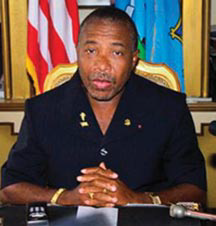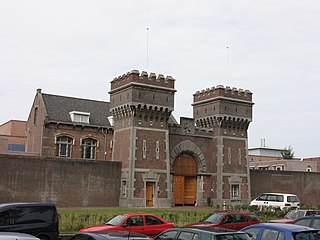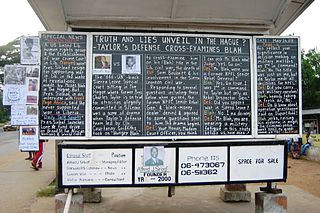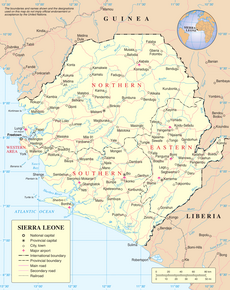
The International Criminal Tribunal for the former Yugoslavia (ICTY) was a body of the United Nations that was established to prosecute the war crimes that had been committed during the Yugoslav Wars and to try their perpetrators. The tribunal was an ad hoc court located in The Hague, Netherlands.

Charles McArthur Ghankay Taylor is a Liberian former politician and convicted war criminal who served as the 22nd president of Liberia from 2 August 1997 until his resignation on 11 August 2003 as a result of the Second Liberian Civil War and growing international pressure.

International criminal law (ICL) is a body of public international law designed to prohibit certain categories of conduct commonly viewed as serious atrocities and to make perpetrators of such conduct criminally accountable for their perpetration. The core crimes under international law are genocide, war crimes, crimes against humanity, and the crime of aggression.

The Special Court for Sierra Leone, or the "Special Court" (SCSL), also called the Sierra Leone Tribunal, was a judicial body set up by the government of Sierra Leone and the United Nations to "prosecute persons who bear the greatest responsibility for serious violations of international humanitarian law and Sierra Leonean law" committed in Sierra Leone after 30 November 1996 and during the Sierra Leone Civil War. The court's working language was English. The court listed offices in Freetown, The Hague, and New York City.
George Gelaga King was a judge in Sierra Leone, West Africa, and recently a justice of the Special Court for Sierra Leone.
A new civil war began in 1999 when a rebel group backed by the government of neighboring Guinea, the Liberians United for Reconciliation and Democracy (LURD), emerged in northern Liberia. By the spring of 2001, they were posing a major threat to the Taylor government. Liberia was now engaged in a complex three-way conflict with Sierra Leone and the Guinea Republic. By the beginning of 2002, both of these countries were supporting the latest addition to the lexicon of Liberian guerrilla outfits – Liberians United for Reconciliation and Democracy (LURD), while Taylor was supporting various opposition factions in both countries. By supporting Sierra Leonean rebels, Taylor also drew the enmity of the British and Americans.

Belgisch Park is a neighbourhood in the Scheveningen district of The Hague, Netherlands. The area has around 7,900 residents and contains many trees and the adjoining “Nieuwe Scheveningse Bosjes” and “Oostduinen”. The buildings date from the period 1870–1940. Many of the houses are expensive private residences.

People detained by the International Criminal Court (ICC) are held in the ICC's detention centre, which is located within a Dutch prison in Scheveningen, The Hague. The ICC was established in 2002 as a permanent tribunal to prosecute individuals for genocide, crimes against humanity, war crimes, and the crime of aggression. As of June 2018, it has issued public arrest warrants for 42 individuals, six of whom are currently in custody of the court.

The Hague Penitentiary Institution is a Dutch prison that is part of the Judicial Institutions Department of the Ministry of Justice. It can accommodate more than 1,000 detainees and consists of two locations, at Zoetermeer and Scheveningen. The Zoetermeer location is for Systematic offenders and the Scheveningen location serves as a Penitentiary Psychiatric Center, the 'open design' Limited Secured Installation and Judicial Medical Center. A special independent unit in the Scheveningen location serves as a United Nations Detention Unit (UNDU) for international offenders where they remain in pre-trial detention under the responsibility of the United Nations like suspects of the International Criminal Tribunal for the former Yugoslavia (ICTY) and of the International Criminal Court (ICC).

Brenda J. Hollis is an American lawyer. She was appointed by United Nations Secretary-General Ban Ki-moon as Prosecutor of the Special Court for Sierra Leone in February 2010, replacing Stephen Rapp. Hollis was the Chief Prosecutor at the Special Court and served as the lead prosecutor in the trial and appeal of the case against Charles Taylor, the former President of Liberia. Hollis previously served as the Prosecutor of the Residual Special Court for Sierra Leone, which replaced the Special Court in December 2013; currently James Johnson, an adjunct professor at Case Western Reserve University School of Law, serves as the Chief Prosecutor for the Residual Special Court for Sierra Leone. She also serves as the Reserve International Co-Prosecutor for the Extraordinary Chambers in the Courts of Cambodia, and works as a consultant in international criminal law and procedure.

United Nations Security Council resolution 1343, adopted unanimously on 7 March 2001, after recalling resolutions on Sierra Leone and the region, including resolutions 1132 (1997), 1171 (1998) and 1306 (2000), the Council demanded that Liberia end its support for rebels in Sierra Leone and threatened the imposition of wide-ranging sanctions unless the country complied with the Security Council.

United Nations Security Council resolution 1436, adopted unanimously on 24 September 2002, after recalling all previous resolutions on the situation in Sierra Leone, the Council extended the mandate of the United Nations Mission in Sierra Leone (UNAMSIL) for a further six months beginning on 30 September 2002.

United Nations Security Council resolution 1470, adopted unanimously on 28 March 2003, after recalling all previous resolutions on the situation in Sierra Leone, the Council extended the mandate of the United Nations Mission in Sierra Leone (UNAMSIL) for six months until 30 September 2003.

United Nations Security Council resolution 1497, adopted on 1 August 2003, after expressing concern at the situation in Liberia, the Council authorised a multinational force to intervene in the civil war to support the implementation of a ceasefire agreement using "all necessary measures".

United Nations Security Council resolution 1508, adopted unanimously on 19 September 2003, after recalling all previous resolutions on the situation in Sierra Leone, the Council extended the mandate of the United Nations Mission in Sierra Leone (UNAMSIL) for six months until 31 March 2004.

United Nations Security Council Resolution 1941, adopted unanimously on September 29, 2010, after recalling all previous resolutions on the situation in Sierra Leone, particularly Resolution 1886 (2009), the Council extended the mandate of the United Nations Integrated Peacebuilding Office in Sierra Leone (UNIPSIL) until September 15, 2011.

United Nations Security Council resolution 1638, adopted unanimously on 11 November 2005, after recalling all previous resolutions on the situation in Liberia, Sierra Leone and West Africa, the Council included the apprehension, detention and transfer to the Special Court for Sierra Leone of former Liberian President Charles Taylor in the mandate of the United Nations Mission in Liberia (UNMIL).

United Nations Security Council Resolution 1667, adopted unanimously on March 31, 2006, after recalling all previous resolutions on the situations in Liberia and the subregion, particularly resolutions 1626 (2005) and 1638 (2005), the Council extended the mandate of the United Nations Mission in Liberia (UNMIL) until September 30, 2006.

United Nations Security Council Resolution 1689, adopted unanimously on June 20, 2006, after recalling all previous resolutions on the situation in Liberia and West Africa, the Council decided to continue sanctions against the import of diamonds from the country for six months, though similar restrictions relating to timber imports were lifted.

The United Nations Detention Unit (UNDU) is a UN-administered jail. It is part of the Hague Penitentiary Institution's Scheveningen location, more popularly known as Scheveningen Prison, in The Hague, Netherlands. The UNDU was established in 1993 as part of the International Criminal Tribunal for the former Yugoslavia (ICTY) and currently houses detainees whose cases have been taken over by the International Residual Mechanism for Criminal Tribunals (IRMCT).
















